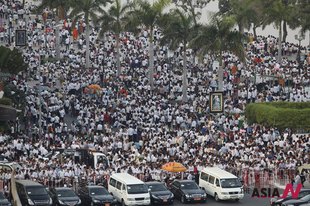Hundreds of Korean students forced to work during WWII
Hundreds of Korean students who refused to serve in the Japanese military during World War II were instead forced to work at factories in Korea, an investigative panel of the government said Monday.
Many of them were studying at prestigious universities in Korea and Japan, including Waseda and Keio, when they were drafted to fight for Japan as “student soldiers.”
They rejected doing so and were sent to domestic factories as forced laborers, according to the committee which is investigating forced labor victims during the Japanese colonial period (1910-45).
The Japanese government classified the Korean conscription objectors as “political offenders” to strictly monitor them, said the committee under the Prime Minister’s Office.
The revelation came days ahead of the 67th anniversary of Korea’s liberation from Japanese colonial rule on Aug. 15.
Japan’s colonial documents reported to its parliament in 1944 showed that 125 Korean students were sent to factories after draft dodging.
However, the investigative panel claimed that more than 400 students became forced laborers in the 1940s, considering that about 150-200 students were drafted for an enlistment group, and several witnesses said there were at least two enlistment groups.
The committee officially identified 65 students who worked at factories instead of serving in the Japanese military. They include former Seoul National University Professor Han Woo-geun; Yeo Seok-ki, a professor emeritus at Korea University; democracy activist Kye Hoon-je; and former Education Vice Minister Seo Myung-won.
The committee also revealed diaries and essays written by some of the students while they worked at the factories.
They showed the students had to receive military training and education at the workplaces because they were deemed “unqualified” to become loyal subjects to the Japanese emperor. The students used separate rooms from other workers.
Many of the forced laborers suffered from malnutrition, injuries and diseases such as lung trouble while toiling in the harsh environment, the committee said.
It noted it is impossible for the victims to get compensation because, under the current law, those who were forced to work for domestic companies during the colonial period are not entitled to it. The students worked at cement factories and railway firms in Korea, which were effectively controlled by the Japanese government.
According to the committee, some 226,000 Koreans were registered as being forced to either work for Japanese companies or conscripted to Japan’s wartime army during the colonial era.
Among them, only 23,670 people were able to receive compensation from the Korean government as the rest of the victims weren’t mentioned in the records. <The Korea Times/Na Jeong-ju>




